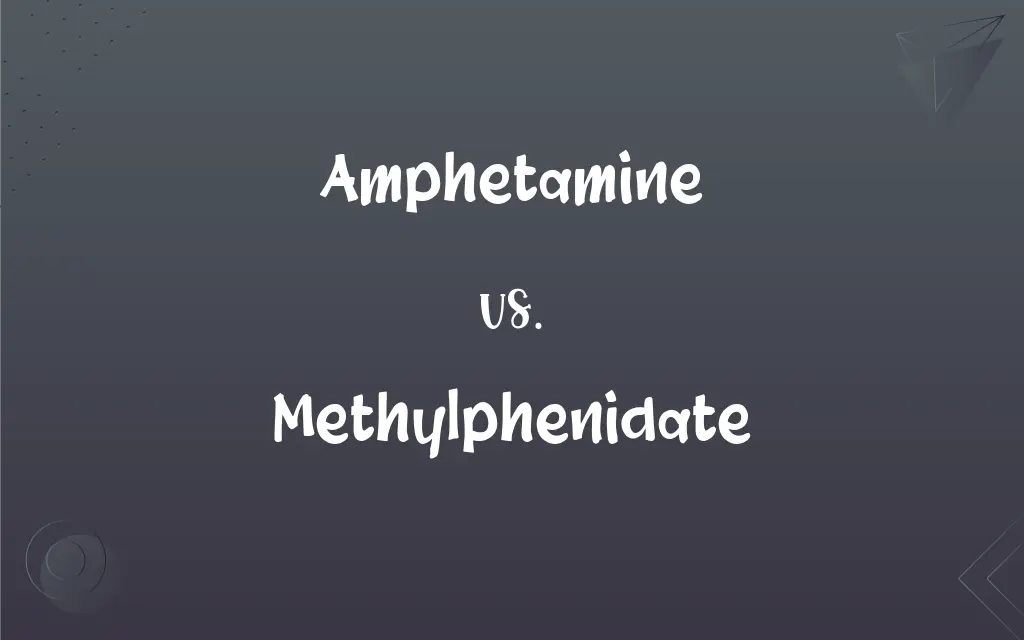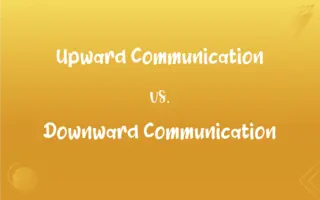Amphetamine vs. Methylphenidate: What's the Difference?
Edited by Aimie Carlson || By Harlon Moss || Updated on October 4, 2023
Amphetamine is a central nervous system stimulant, often used to treat ADHD and narcolepsy. Methylphenidate, also a stimulant, is primarily prescribed for ADHD.

Key Differences
Amphetamine, known for its stimulant properties, is frequently utilized in medications for attention deficit hyperactivity disorder (ADHD) and narcolepsy. Methylphenidate, on the other hand, is another stimulant specifically designed for the treatment of ADHD and is best known by its brand name, Ritalin.
The mechanism of action for both drugs is somewhat similar in that they both affect neurotransmitter levels in the brain. However, Amphetamine works primarily by releasing stored neurotransmitters, while Methylphenidate primarily inhibits their reuptake, leading to increased levels in the synapse.
Both medications can be effective for managing ADHD, but they have distinct pharmacological profiles and potential side effects. While Amphetamine products might include names like Adderall or Evekeo, Methylphenidate can be found under names like Ritalin or Concerta.
Despite their therapeutic applications, both substances carry the risk of misuse and dependency. It's crucial for physicians to monitor usage and for patients to use Amphetamine and Methylphenidate strictly as prescribed.
Comparison Chart
Primary Uses
ADHD, narcolepsy
ADHD
ADVERTISEMENT
Mechanism of Action
Releases stored neurotransmitters
Inhibits neurotransmitter reuptake
Common Brand Names
Adderall, Evekeo
Ritalin, Concerta
Chemical Structure
Beta-methylated phenethylamine
Phenethylamine derivative
Dependency Potential
Potential for misuse/dependency
Potential for misuse/dependency
Amphetamine and Methylphenidate Definitions
Amphetamine
A central nervous system stimulant used to treat ADHD and narcolepsy.
The doctor prescribed Amphetamine to help with her narcolepsy symptoms.
ADVERTISEMENT
Methylphenidate
A drug affecting neurotransmitter activity in the brain.
The effects of Methylphenidate allow for increased focus in users.
Amphetamine
A drug that can elevate mood and increase energy.
Some people misuse Amphetamine for its euphoric effects.
Methylphenidate
A stimulant primarily prescribed for ADHD.
Methylphenidate helped him manage his ADHD symptoms during school.
Amphetamine
A medication impacting neurotransmitter levels in the brain.
As an Amphetamine user, he noticed improved concentration.
Methylphenidate
A substance with a risk of misuse and potential dependency.
Like many stimulants, Methylphenidate should be used cautiously and under supervision.
Amphetamine
A substance with potential for dependency if misused.
It's essential to take Amphetamine only as prescribed to avoid addiction.
Methylphenidate
A medication increasing synaptic neurotransmitter levels.
Through Methylphenidate, neurotransmitter reuptake is inhibited, helping brain function.
Amphetamine
A psychoactive compound enhancing alertness and focus.
Amphetamine is sometimes misused for its performance-enhancing properties.
Methylphenidate
Known commercially as Ritalin among other names.
His doctor recommended trying Methylphenidate, or Ritalin, for his ADHD.
Amphetamine
A synthetic compound, C9H13N, that occurs as a racemic mixture of two stereoisomers or as one of its stereoisomers (especially dextroamphetamine), derivatives (such as methamphetamine), or salts. Amphetamine acts as a central nervous system stimulant, and various formulations are used in the medical treatment of certain conditions (such as attention deficit hyperactivity disorder) and illegally as stimulants.
Methylphenidate
A drug, C14H19NO2, chemically related to amphetamine, that acts as a mild stimulant of the central nervous system and is used in its hydrochloride form to treat attention deficit hyperactivity disorder and narcolepsy.
Amphetamine
The racemic freebase of 1-phenylpropan-2-amine; an equal parts mixture of levoamphetamine and dextroamphetamine in their pure amine forms.
Methylphenidate
(medicine) A stimulant used to treat attention deficit hyperactivity disorder and narcolepsy, better known by the trade name Ritalin
Amphetamine
(informal) Any mixture of the two amphetamine enantiomers, dextroamphetamine and levoamphetamine.
Methylphenidate
Central nervous system stimulant (trade name Ritalin) used in the treatment of narcolepsy in adults and attention deficit disorder in children
Amphetamine
Referring to a substituted amphetamine; a member of the amphetamine class of chemicals.
FAQs
Are Amphetamine and Methylphenidate stimulant medications?
Yes, both Amphetamine and Methylphenidate are stimulant medications.
Is Methylphenidate utilized to manage ADHD?
Yes, Methylphenidate is often utilized in managing ADHD.
Is Methylphenidate the generic name for Ritalin?
Yes, Methylphenidate is the generic name for the brand drug Ritalin.
How is Amphetamine administered?
Amphetamine is most commonly administered orally, in either tablet or capsule form.
Can both Amphetamine and Methylphenidate be addictive?
Yes, both Amphetamine and Methylphenidate have the potential for abuse and addiction.
Is Amphetamine used in the treatment of narcolepsy?
Yes, Amphetamine is sometimes used in the treatment of narcolepsy.
What is the typical dosage form of Methylphenidate?
Methylphenidate is available in various forms, including oral tablets and capsules.
Can Methylphenidate be used in adults?
Yes, Methylphenidate is prescribed to adults for ADHD and sometimes for narcolepsy.
Are there non-stimulant alternatives to Amphetamine for treating ADHD?
Yes, non-stimulant medications like Atomoxetine are available for treating ADHD.
Can individuals with a history of heart problems take Methylphenidate?
Individuals with heart issues should consult their doctor before taking Methylphenidate due to potential risks.
Are there long-term side effects of using Amphetamine?
Yes, long-term use of Amphetamine can have side effects, including heart issues and mental health effects.
Can children be prescribed Methylphenidate?
Yes, Methylphenidate can be prescribed to children, typically over the age of 6, for ADHD.
What are popular brand names that use Amphetamine?
Popular brands like Adderall and Dexedrine contain Amphetamine.
Can Amphetamine impact mental health?
Yes, Amphetamine can impact mental health, potentially causing anxiety, agitation, and other issues.
How does Methylphenidate affect the central nervous system?
Methylphenidate affects neurotransmitters in the brain, which can enhance concentration and control behavior.
What is Amphetamine commonly prescribed for?
Amphetamine is commonly prescribed to treat Attention Deficit Hyperactivity Disorder (ADHD).
Can Amphetamine be used recreationally?
While it is a prescription medication, Amphetamine can be used recreationally, which is illegal and dangerous.
What are the common side effects of Methylphenidate?
Common side effects of Methylphenidate include insomnia, decreased appetite, and possible increases in blood pressure.
Is Amphetamine effective in improving focus?
Yes, Amphetamine is known to enhance focus and attention, particularly in individuals with ADHD.
What precautions are necessary when taking Methylphenidate?
Taking Methylphenidate requires monitoring for side effects, adhering to dosage guidelines, and avoiding certain activities like driving if feeling drowsy.
About Author
Written by
Harlon MossHarlon is a seasoned quality moderator and accomplished content writer for Difference Wiki. An alumnus of the prestigious University of California, he earned his degree in Computer Science. Leveraging his academic background, Harlon brings a meticulous and informed perspective to his work, ensuring content accuracy and excellence.
Edited by
Aimie CarlsonAimie Carlson, holding a master's degree in English literature, is a fervent English language enthusiast. She lends her writing talents to Difference Wiki, a prominent website that specializes in comparisons, offering readers insightful analyses that both captivate and inform.































































